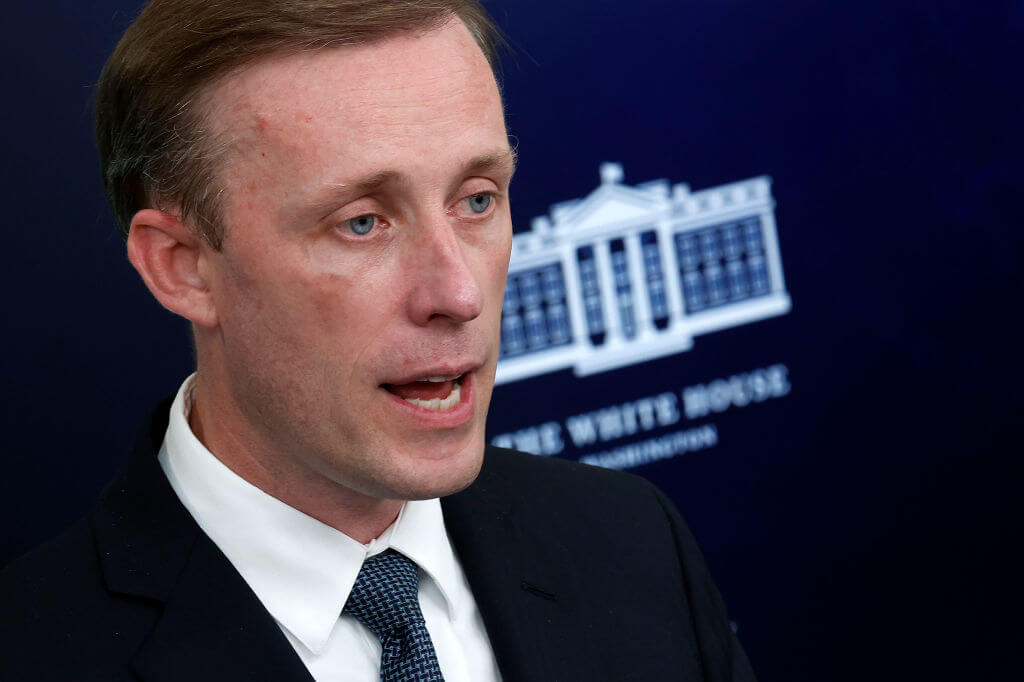Top Biden aide: Israel must focus on a postwar plan
President Joe Biden has reportedly grown frustrated with Israeli Prime Minister Benjamin Netanyahu in recent weeks

White House National Security Adviser Jake Sullivan in 2022. Photo by Chip Somodevilla/Getty Images
The Biden administration is “actively pursuing” a way to shift from the fighting in Gaza to normalization between Israel and Arab states in the region, White House National Security Adviser Jake Sullivan said Tuesday. That postwar vision, he said, aims to guarantee Israel’s security and the establishment of a Palestinian state.
“I know that in this moment where there’s so much anger and pain and so much uncertainty, it’s hard to imagine,” Sullivan said in remarks at the annual World Economic Forum in Davos, Switzerland, “but it really is the only path that provides peace and security for all.”
Sullivan said that the plan is “not impractical” despite the Israeli government’s public opposition to a reformed Palestinian Authority controlling the Gaza Strip. “The pieces are there to be put together to achieve this outcome — and not years down the road, but in the near term — if all of us pull together and make the wise and bold decisions to choose this course,” he said.
President Joe Biden has reportedly grown frustrated with Israeli Prime Minister Benjamin Netanyahu in recent weeks over his refusal to talk about resolving the Israeli-Palestinian conflict after the war, and his refusal to release Palestinian tax revenues Israel is withholding. The two leaders haven’t spoken in more than three weeks since their last phone conversation, on Dec. 23, which was described by U.S. officials as “tense.”
Biden so far has not called on Israel to end the military campaign against Hamas. Netanyahu, widely blamed in Israel for failing to prevent the Oct. 7 attack, won’t engage, his critics say, because he’s trying to appeal to his political base and preserve power. “I won’t allow Hamastan to be replaced by Fatahstan,” is a slogan the Israeli leader has repeated recently in public remarks, referring to the most dominant political party in the West Bank. A Hebrew University poll published last month showed only 11% of Israelis support the return of the Palestinian Authority to Gaza.
Blinken up next
Sullivan acknowledged that the U.S. and Israel have not been perfectly aligned in recent weeks, adding that “there are elements and voices in that government” whose statements and stances the Biden administration had to publicly condemn. But he maintained that the U.S. postwar vision “does not deviate very much” from the proposal that Biden and Netanyahu had discussed in the weeks before the Oct. 7 attack.
Sullivan said that the Israeli government will ultimately need to decide on the best way to guarantee and ensure the security of the state of Israel. “It is President Biden’s firm conviction that the best way to do that is two states with Israel security guaranteed,” he said.
Israelis have grown more skeptical of a two-state solution, according to recent surveys. But it is understood that a deal with Saudi Arabia will have to include some solution to the Palestinian issue. Saudi Arabia’s foreign minister, Prince Faisal bin Farhan, also speaking in Davos, said the kingdom will recognize Israel in exchange for “peace for the Palestinians through a Palestinian state.”
Secretary of State Antony Blinken is also expected to discuss the administration’s handling of the war and postwar issues in a conversation with New York Times columnist Thomas Friedman early Wednesday morning.
A group of 235 retired Israeli security officials and former diplomats published a joint statement Tuesday blasting those who seek to weaken the U.S.-Israel relationship “through irresponsible rhetoric and defiant bluster.”
“The strategic cooperation with the U.S. is crucial for Israel’s security,” the statement reads.














